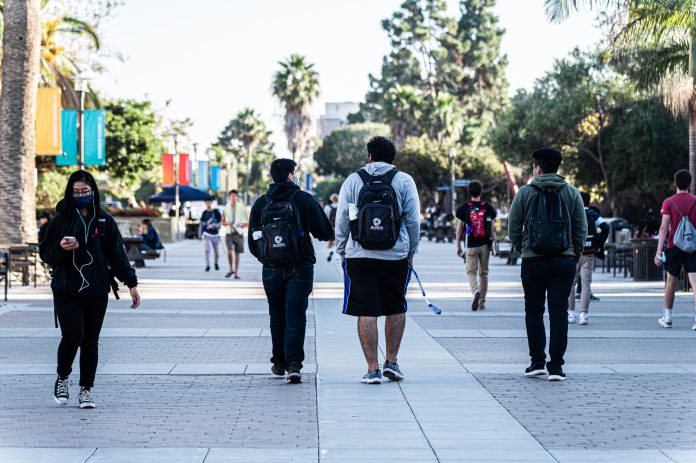Ariel Andres
Staff Writer
After one and a half years of remote learning, thousands of students are finally coming back to school. What else accompanies this return? Social anxiety, awkward moments, and a serious need to connect with others. While many are tired of the isolation caused by the pandemic, not everyone is a social butterfly who can make friends easily.
Talking about what it’s like being around so many people again, David Garcia, a fourth-year, says, “I honestly forgot how to talk to people. Back home, all my closest friends were hours away.”
It might be especially difficult for sophomores who spent their first year entirely remote. One second-year says, “Because of COVID, I feel like I’m behind on getting involved in campus life and making those deep friendships you’re supposed to make when you’re in college, and now I’m not sure where to start.”
As an introvert, I also felt that coming back to campus and socializing with everyone was alien, and I’m sure that plenty of other students feel that way too. Whether you’re rusty at socializing or you’re just not sure where to start, here are some suggestions to help put yourself out there.
Join an organization. Whether it’s a social or professional on-campus Whether it’s a social or professional on-campus organization or a nearby volunteer group, meeting up with a group of like-minded people can make a huge difference. During the pandemic, I joined a recently-created campus organization called Gaucho Creative (GC), UC Santa Barbara’s Marketing and Consulting Group. It’s a professional organization focused on marketing and consulting, but there’s also an extremely strong social aspect to it. Everybody knows each other and everyone is always supporting each other. In fact, one of my friends in GC was about to transfer schools because they felt isolated during the pandemic, but GC’s culture and community helped change their minds.
Join study groups. This is not always the case, but oftentimes studies groups result in strong and lasting friendships. Not always This is not always the case, but oftentimes study groups result in strong and lasting friendships. Not always great for studying, but ideal for our purposes. Study groups can be a great way to meet new people and form new connections. Everyone in these groups are usually focused on the same thing, so it’s easy to feel comfortable and get conversations flowing.
Take it slow. You don’t have to feel as if you need to immediately become an insanely charismatic individual. Begin with something small. Initiate a quick and simple conversation with a cashier. Ask them how their day is going. Talk to someone sitting next to you in your lecture about the material you’re learning. Go to a social event near you for just fifteen minutes rather than staying for the entire duration.
The point is to take baby steps so that you gradually become more comfortable in these types of situations. You have plenty of time to work on your social goals, so no need to rush.
Social Anxiety. The primary culprit of social anxiety is your amygdala working overtime trying to think of all the things that could go wrong. It can be debilitating and feel like someone is gripping your chest and squeezing as hard as they can. I’ve gone through it too, and I understand it’s not easy to deal with. Some practices that have helped me are listening to music, taking deep breaths, and not caring about what happens. These exercises won’t make social anxiety disappear entirely, but with consistency, they may offer some relief.
When it comes to music, put on something to put you in a good, relaxed mood. Listen to tracks that make you feel confident and unstoppable. Pump yourself up. For some reason, listening to oldies always lifts my mood. Stand-up comedy is also helpful. Find your favorite Netflix special or comedian on YouTube and listen to them to put you in a relaxed and amiable mood.
Back in high school, I’d always freak out about not knowing what to say when having a conversation with someone. Something that helped with that was having a couple conversation starters before going to any social event. It’s a little corny, but it was relieving knowing I’d always have something interesting or funny to talk about.
Finally, accept that embarrassing, awkward, and weird stuff happens all the time! I know it’s easier said than done (I personally went through hell to be able to embrace that), but work on it over time. When you stop making a big deal about embarrassing or awkward moments and just consider them a little tiny event that everyone will probably forget the next day, you’ll feel a lot better. That process also becomes easier when you learn to laugh at yourself when those things happen.
Regardless, if you’re going to a social event or outing, but your social anxiety is especially intense, then consider sitting that one out. More importantly, don’t beat yourself up. Like I mentioned earlier, you’ll have plenty of opportunities and time.
All in all, coming back to school and socializing with a bunch of strangers after not doing so in months can be daunting for some people, which is why I wanted to share these suggestions. They have been incredibly helpful to me and I hope they will be helpful to you as well.











